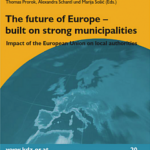CITIES MATTER: INVOLVING CITIES IN ESF POST 2020 TO ADDRESS SOCIAL CHALLENGES
Between 2014 and 2017, the European Social Fund (ESF) already brought tangible results in cities, ranging from better access to education and jobs to improved service provision to vulnerable groups. In the current funding period, an increasing number of cities expanded their responsibilities to manage local or regional ESF funding for metropolitan areas. These achievements at local level were reported in a survey conducted by EuroCities. EuroCities analysed ESF practices of 32 cities from 13 EU member states. The report includes good practices from the cities on how they exactly used ESF for initiatives related to social inclusion and social innovation. The following Danube Region countries and cities were represented:
- Austria: Vienna
- Croatia: Zagreb
- Czech Republic: Brno
- Germany: Karlsruhe, Munich, Nuremberg, Stuttgart
The results showed that the local programming approach proved to be successful and managed to serve as a catalyst for social innovation at local level. Cities accomplished to use ESF to pilot social innovations and mainstream the good practices in regular service provision to improve public services.
However, the biggest obstacle for cities to access and use the ESF is the complexity of rules and procedures generating a high administrative burden and the mismatch between the ESF programme priorities and their locally-identified needs. According to the survey, local needs were better met when cities were directly involved in defining the programme priorities.
LESSONS LEARNED FOR POST 2020
The EuroCities survey not only provides interesting insights in the current ESF practice at local level, but also provides useful recommendations for the future of ESIF, and the ESF in particular.
Despite the increasing involvement of cities in the current funding period, there is still room for improvement to use the full potential for piloting social innovations in urban areas. EuroCities summarised the following issues for consideration in the ESF post 2020 debate:
- supporting all cities affected by profound social challenges
- involving cities in defining ESF priorities
- ensuring ESF can better address the social challenges in cities
- making ESF programmes more flexible in adapting to new challenges
- making ESF a catalyst for social innovation at local level
- simplifying the rules and procedures governing the ESF
- making it easier to combine ESF with other EU funds




